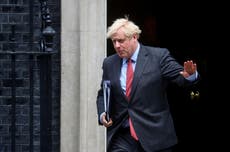For all his pandemic mistakes, Boris Johnson deserves credit for pushing for WHO funding
The prime minister’s announcement has helped to rescue one of the most crucial international institutions from bankruptcy at a time when it is needed more than ever

Your support helps us to tell the story
From reproductive rights to climate change to Big Tech, The Independent is on the ground when the story is developing. Whether it's investigating the financials of Elon Musk's pro-Trump PAC or producing our latest documentary, 'The A Word', which shines a light on the American women fighting for reproductive rights, we know how important it is to parse out the facts from the messaging.
At such a critical moment in US history, we need reporters on the ground. Your donation allows us to keep sending journalists to speak to both sides of the story.
The Independent is trusted by Americans across the entire political spectrum. And unlike many other quality news outlets, we choose not to lock Americans out of our reporting and analysis with paywalls. We believe quality journalism should be available to everyone, paid for by those who can afford it.
Your support makes all the difference.It isn’t often I feel proud of what the British government is doing. The country lurches from one cringe-making disaster to another: the endless series of missteps in the management of Covid-19; the self-harming approach to Brexit: the cavalier approach to the rule of law; the humiliating attempts to curry favour with the Trump administration. But Boris Johnson’s under-reported appearance at the UN General Assembly and his commitment to funding the World Health Organisation (WHO) did not get the praise it deserved.
The cynical part of me says that he didn’t really mean it; that the money represents a double counting of commitments already made or a cut in some equally important budget elsewhere; and that I am being suckered, credulously, into endorsing a No 10 PR stunt. Perhaps.
But, taken at face value, Johnson’s announcement has helped to rescue one of the most crucial international institutions from bankruptcy at a time when it is needed more than ever. The UK approach is a stark contrast with the petulant and destructive behaviour of the Trump administration, which cancelled its subscription to the WHO as part of its pre-election propaganda war with China. Removing its largest membership contribution at a stroke threatened the organisation’s very existence
The psychologically and materially invaluable decision of the British government to pledge four years funding with a 30 per cent uplift continues Britain’s good record in this area. Two years ago, pre-Covid, the UK led the response to a call for additional voluntary contributions together with Sweden, Norway and Australia, along with the Gates Foundation, to sustain the work on preventable diseases which was contributing to real progress in meeting the UN Millennium Goals for development.
The timing of the new announcement is additionally significant because there is a real danger that the global pandemic response is becoming fragmented and subject to narrow national self-interest. With nine major vaccine programmes now at the stage of clinical trials, there is a risk of vaccine nationalism: a repeat of the unseemly international scramble for PPE kit at the expense of countries with the greatest need but the least bargaining power. The best response, to stop panic buying and selfish hoarding, is a global programme of the kind the WHO is orchestrating and the UK is supporting.
The bigger picture is one in which, as a malign legacy of the Trump administration, multilateral cooperation on all manner of common problems is under threat: global warming; the WTO trade rules, nuclear proliferation. For Britain, a medium-sized power now cut adrift from Europe, there is a fundamental choice between working with other, like minded, countries to make the multilateral institutions work, or meekly tagging along behind whatever the president of the United States decides is most likely to appeal to voters in Wisconsin in his daily tweets.
I had assumed that a Johnson administration would simply grovel in deference to Donald Trump’s demands but I have been pleasantly surprised in the last few weeks – on Iran and now on the WHO – to see the opposite. Either there is more of a backbone than initial impressions suggested; or the government has calculated that Trump won’t be around for much longer. Both are brave: the first since Trump punishes disloyalty; the second because he seems to be planning a coup to stay in power indefinitely, albeit one led by lawyers rather than soldiers.
The future of multilateral cooperation through the WHO and elsewhere is complicated by the emergence of China as the other superpower. Setting aside the continuing arguments about what happened in Wuhan at the outbreak of the pandemic, China does not have a great record in the WHO. The former director-general, the Norwegian stateswoman Gro Harlem Brundtland, had to admonish China for concealment during the Sars outbreak earlier in the century. The sensitivities around Taiwan have prevented Taiwan’s undoubted skills in pandemic management being pooled for the common good.
Now that Britain has stepped up to the plate on the WHO it is in a good position to work jointly with countries like Germany, Japan and Canada to demand of China, as a superpower, that it should match its rhetoric on multilateral cooperation on pandemics, as with trade, climate and other issues, by actually delivering (and paying a bigger share of the costs). That would be a better use of our “soft power” (which is all we now have) than pious, finger-wagging, virtue signalling over human rights.
Britain has serious credibility on issues related to aid and development and it is good to see that credibility being put to good use. Apart from the Scandinavians, Britain is one of the few countries with a sustained record of meeting its obligations, as with the 0.7 per cent of GDP aid target. In recent months there have been suspicions that the merging of DfID into the Foreign Office was part of a cunning plan to wriggle out of the obligation, under pressure from Conservative back benchers and their media allies arguing that “charity should begin at home” – and, very often, end at home.
The aid target was embodied in law by the coalition government at the insistence of the Lib Dems and it is to the credit of David Cameron and his successors, and some able, committed Conservative ministers like Andrew Mitchell and Justine Greening, that they took it seriously throughout all the years of austerity. No minister was ever going to appear in Bow Street Magistrates Court for failing to adhere to this particular law-or other declaratory laws, as with the climate crisis and carbon emissions. But, until the wobble of the last few weeks, the law was the law and was respected as such (albeit with a bit of cheating at the margins and the promise of more cheating to come).
Perhaps the most valuable contribution made by the UN announcement is that it helps to shift attention back to where the pandemic is hurting most, in the poorest countries. We have developed an obsessive national interest in every twist and turn in the British aspect of the pandemic. In doing so, we have lost sight of the confusing, complex and contradictory bigger picture. We do not yet know why the disease has produced few fatalities in some places, but in others – like Manaus in Brazil and Guayaquil in Ecuador bodies were piled in the street as in a mediaeval plague.
The situation in some countries in Africa is especially unsettling. In Uganda, thousands are dying from hunger or other untreated diseases in lockdown and a generation of children have no schooling. But Covid fatalities are difficult to find despite extensive testing. In next-door Tanzania, a Covid-denying president seems to have saved his country from a lot of suffering by ridiculing the scientists and doing nothing – though it should be said that Tanzania has no statistics that anyone believes in. It seems likely that, in demographically young countries with desperately over-stretched public health systems, the European (and Chinese) rapid and thorough lock-down strategy is wholly inappropriate.
That conclusion is being reinforced in India where the early, tough, lockdown imposed suddenly by central government appears to have been a total disaster, causing great hardship amongst tens of millions of migrant workers, a dispersal of the disease into deepest rural India and a complete loss of trust in the authorities.
The global nature of the pandemic means that its progress and remedies have to be studied and acted on globally. The WHO is the forum within which to do that, and the British government deserves credit for acting to strengthen it. It’s rare one can say of Boris: the boy did good.





Join our commenting forum
Join thought-provoking conversations, follow other Independent readers and see their replies
Comments